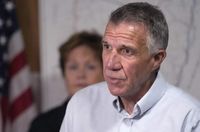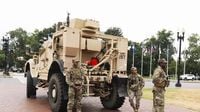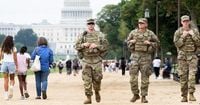Washington, D.C. has once again become the nation’s flashpoint for fierce debates over crime, policing, and the balance of power between federal and local authorities. Over the last two weeks, the city has seen a dramatic influx of National Guard troops—more than 1,100 from Republican-led states across the South and Midwest—joining nearly 800 members of the District’s own National Guard already deployed. The stated mission: to restore order, bolster public safety, and, according to the Trump administration, crack down on crime and immigration violations in the capital.
The move, orchestrated by the White House and welcomed by governors from West Virginia, South Carolina, Ohio, Tennessee, Mississippi, and Louisiana, has not only heightened tensions in Washington but has also set the stage for a national showdown over who controls America’s cities—and how.
Troops on the Streets, Missions on the Ground
The deployments began after President Donald Trump issued an executive order declaring a “crime emergency” in the District of Columbia. On August 11, 2025, he ordered 800 D.C. National Guard troops into action, citing what he called a surge in crime. Governors from the six Republican-led states soon followed, sending their own Guard units at the administration’s request. According to the Associated Press, the latest wave of deployments on August 18 brought the total of out-of-state troops to more than 1,100.
Each state’s Guard has been assigned specific duties. Tennessee’s National Guard, for instance, is tasked with monument security, traffic control, and protection of federal facilities. Other units are embedded in community patrols and crowd management, working alongside federal law enforcement agencies such as the DEA, ICE, FBI, and the Secret Service. All operations are federally funded and commanded, a move that, as Reuters points out, is legally permissible under the hybrid Title 32 status—troops remain under state command but follow federal regulations and funding.
Crime, Immigration, and the Politics of Policing
The Trump administration has framed the operation as a necessary response to violent crime and public disorder. The White House has touted statistics showing 380 arrests in the week following the operation’s start, including 137 arrests and the seizure of 21 illegal firearms over a single weekend. Federal agents have also arrested 160 undocumented individuals, whom officials allege are known gang members with prior felony offenses. Attorney General Pam Bondi declared on social media, “Washington, DC is getting safer every night thanks to our law enforcement partners.”
But critics, including D.C. Mayor Muriel Bowser, argue that the operation is less about crime and more about immigration enforcement—a central theme of Trump’s second term. Bowser challenged the administration’s narrative, saying, “I think it makes the point that this is not about D.C. crime. The focus should be on violent crime. … Nobody is against focusing on driving down any level of violence. And so if this is really about immigration enforcement, the administration should make that plain.” According to AP, Bowser has also voiced concern about the administration’s order for local police to cooperate with federal immigration authorities, which contradicts local laws.
Local officials point to D.C.’s own crime data, which shows that while challenges with homicides and carjackings remain, overall crime rates have actually decreased compared to previous years and are notably lower than those in cities like Chicago, Philadelphia, and Baltimore. D.C. Councilmember Trayon White, who once described the city as a “war zone” and called for National Guard assistance, now finds his words cited by those arguing that the city can’t manage public safety on its own.
Federal Authority Versus Home Rule
The deployment has reignited long-standing tensions over the District’s autonomy. Washington, D.C., unlike other states, has its National Guard reporting directly to the president. As Reuters explains, this gives the White House unique authority to activate troops in the capital—an authority Trump has not hesitated to use. The operation is also a test case in the broader battle over states’ rights, federal power, and the future of urban governance.
Some see the deployment as a show of force and a symbolic rebuke of Democratic-led city governments. Others view it as a politically motivated overreach that risks damaging police–community relations and undermining local authority. The city’s attorney general has even sued the administration for appointing the head of the DEA as “emergency police commissioner,” a move that was later rescinded but followed by new orders for local police to fully cooperate with federal immigration authorities.
Legal Gray Areas and the Threat of Escalation
Legally, the situation is complex. The Posse Comitatus Act generally prohibits the use of the U.S. military for domestic law enforcement, but exceptions exist for National Guard troops under state command or Title 32 status. Trump has suggested that similar deployments could extend to other cities—like New York and Chicago—but his authority there is much more limited. Any attempt to send National Guard troops from Republican-led states into Democratic strongholds without local consent would likely spark legal challenges, as Reuters notes.
There are also questions about how far the administration might go. The Insurrection Act, a rarely used law allowing the president to deploy troops in cases of insurrection or rebellion, could theoretically be invoked, but only under specific conditions. Its use in the past—to enforce civil rights or quell riots—remains controversial, and any move to invoke it now would almost certainly deepen the political and legal standoff.
Community Response and the Human Cost
On the ground, the increased federal and military presence has sparked protests and concern among residents. On August 18, dozens gathered in the U Street neighborhood to oppose the crackdown, which has included high-profile arrests by masked federal agents who have sometimes refused to identify themselves. Bowser has called for transparency, stating, “It’s very important to us that agents be identified. There’s no reason for a law enforcement official to be masked.”
Meanwhile, uncertainty lingers over whether National Guard troops will be armed. Pentagon officials have stated that weapons remain in the armory, but the D.C. Guard has said troops “may be armed consistent with their mission and training.” The ambiguity has only added to the unease and confusion on D.C.’s streets.
A Nation Watching Its Capital
As the capital city becomes the epicenter of America’s struggle over crime, immigration, and the boundaries of federal power, the rest of the country watches closely. For some, the deployment is a necessary step to restore order and protect federal property. For others, it’s a dangerous precedent that threatens the very principles of democracy and local self-governance.
Whatever the outcome, Washington, D.C. now stands as ground zero in a much larger conflict—one that will shape the nation’s approach to public safety, civil liberties, and the delicate balance between federal authority and local control for years to come.



